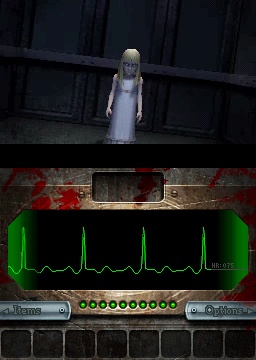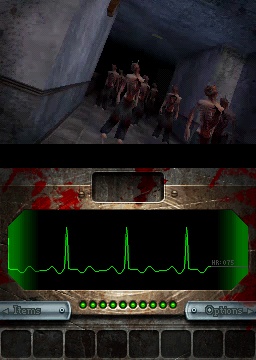Is it possible to be legitimately spooked by a handheld game? Console games have been designed to make use of the home field advantages of having a large screen and complete control over lighting to enhance the experience for years, but when you're playing on a tiny screen on the bus, can the experience compare? The answer, as proven by FPS-with-a-dash-of-survival horror Dementium: The Ward, is a resounding yes, though its inherent flaws prevent it from truly becoming that which it aspires to be.
Dementium tells the twisted tale of a man who wakes up in the bed of a monster-infested hospital after taking a wheelchair trip from hell. You will navigate him through the worn halls of the massive building and try to piece together who he is and why he's there as you battle zombies, parasitic worms that wail like babies, and the occasional cleaver-wielding demon. The game is divided into a series of chapters that for the most part correlate to the various floors of the hospital. Chapters vary greatly in length--some are as short as a minute or two and others last as long as half an hour--and are often punctuated by short, tightly directed cutscenes that introduce new enemies or shed new light on the protagonist's identity and past. At several points in your journey you will encounter a powerful boss, such as the aforementioned cleaver-wielding demon, that will tax your skill and supply of ammo in a climactic battle.

The gameplay itself is very much a mixture of Doom and Silent Hill that combines some of the best elements of each for a fairly straightforward horror experience. Early on, you will find a flashlight to light your way through the pitch-black corridors, and as you navigate through the twisted hospital two melee weapons and five guns will become available. Dementium is essentially a traditional FPS in terms of action and control, but thanks to the sparse placement of ammo, combat becomes more of a fight-or-flight scenario than a matter of deciding which of your weapons are going to splatter your enemy. Unfortunately, while you apparently have the physical dexterity to use larger weapons with both hands, you lack the rudimentary skill to use the flashlight simultaneously with a weapon, leading to situations in which you must quickly toggle back and forth between your guns and your flashlight to see what you're shooting at.
In addition to running and gunning, a number of puzzles are thrown in that range from a simple substitution cipher to a complex treasure hunt for three pieces of a photograph to learn a door code. You have access to a notepad to scrawl clues or hints in, but the various maps you find inexplicably don't allow this. While the map system borrows a page from Silent Hill's playbook and keeps track of doors that are locked or broken (which is nearly all of them, also like Silent Hill), it does not keep track of the many blocked-off corridors you will encounter, and the ability to self-notate these would have been welcome.
Dementium shines the most in terms of presentation, most notably in the area of sound design. It is imperative that you play it with headphones, because listening to the audio clues provided by the 3D sound system is essential in determining what is around the corner. Each enemy makes a unique sound, and often, as is the case with the flying Medusa heads, a brief audio warning is all you'll get before you're attacked. In addition to enemy sound effects, certain rooms are filled with intensely creepy noises such as children's singing and phrases spoken backward. An appropriately moody and ambient soundtrack composed of mostly piano pieces rounds out the audio front and contributes greatly to the sense of isolation and desperation that wandering around in a darkened hospital will produce.
Graphically speaking, Dementium runs at a crisp frame rate that never dips despite the number of enemies or atmospheric effects that may show up simultaneously. Textures are incredibly high-quality given the DS hardware, and the flashlight produces a realistic effect, even flickering occasionally, and is appropriately useless in fog to help heighten the mood.

Unfortunately, for every step that Dementium takes in the right direction toward producing an excellent horror experience on a handheld system, it is held back by a series of flaws that undermine its achievements. Level design is incredibly repetitive, and it's not uncommon to find several completely identical storerooms down the same hallway; enemies respawn the moment you exit a room, and so that zombie on the other side of the door that scared you the first time will be there every time, minimizing the fear factor in subsequent visits; and the poorly implemented save system, which forces you to restart at the beginning of the chapter upon death despite saving each time you open a door, is counterproductive given that forced replays through lengthy chapters all but eliminates the horror and replaces it with frustration.
Ultimately, Dementium: The Ward is an entertaining shooter that makes great strides in creating a portable horror experience but holds itself back from really accomplishing what it set out to do. Easily beatable in four to five hours by an accomplished player, its static puzzles and enemy placement leave no reason to run through it again, but its memorable sound design and creepy ambience make it well worth a play.